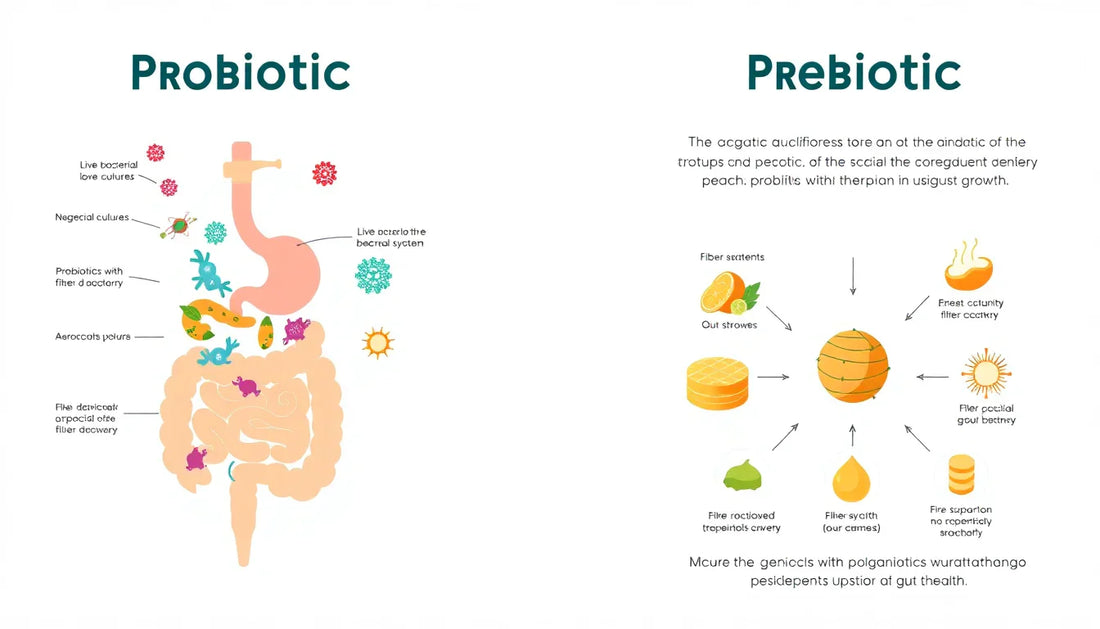
Probiotics vs. Prebiotics: What’s the Difference for Gut Health?
Share
Maintaining a healthy gut is essential for overall well-being. Our gut microbiome, the diverse community of microorganisms living in our digestive system, plays a crucial role in supporting immune function, regulating digestion, and even influencing our mood and mental health. Two key players in gut health are probiotics and prebiotics, but many people are unsure of the differences between the two. In this blog post, we'll explore the unique roles of probiotics and prebiotics, and how they work together to promote a thriving gut microbiome.
Understanding Probiotics
Probiotics are live microorganisms, typically bacteria or yeasts, that are beneficial for our health, especially our digestive system. When consumed, probiotics can help restore the balance of good bacteria in the gut, which can be disrupted by factors like poor diet, stress, or antibiotic use.
Probiotics work by colonizing the gut and competing with harmful bacteria, while also producing substances that support the growth of other beneficial microbes. Some of the most common probiotic strains include Lactobacillus, Bifidobacterium, and Saccharomyces. These can be found in fermented foods like yogurt, kefir, sauerkraut, and kimchi, as well as in probiotic supplements.
The benefits of probiotics for gut health are well-documented. They can help improve digestion, reduce inflammation, and even boost the immune system. Probiotics have been shown to alleviate symptoms of conditions like irritable bowel syndrome (IBS), inflammatory bowel disease (IBD), and antibiotic-associated diarrhea.
Understanding Prebiotics
While probiotics are the live microorganisms that populate the gut, prebiotics are the food that nourishes and supports the growth of these beneficial bacteria. Prebiotics are types of dietary fiber that are indigestible by humans, but can be broken down and utilized by the probiotic bacteria in the gut.
The most common prebiotics are oligosaccharides, which are short-chain carbohydrates found in foods like onions, garlic, bananas, whole grains, and legumes. When these prebiotic fibers reach the colon, they act as a food source for the probiotics, stimulating their growth and activity.
By supporting the proliferation of probiotics, prebiotics play a crucial role in maintaining a healthy gut microbiome. They help increase the diversity and abundance of beneficial bacteria, which can have far-reaching effects on overall health, from improved digestion to enhanced immune function.
Key Differences Between Probiotics and Prebiotics
While probiotics and prebiotics work in tandem to promote gut health, there are some key differences between the two:
- Biological Mechanism: Probiotics are the live microorganisms that colonize the gut, while prebiotics are the indigestible fibers that serve as food for those beneficial bacteria.
- Function in the Gut: Probiotics directly populate the gut microbiome, whereas prebiotics indirectly support the growth and activity of the probiotics already present.
- Interaction: Probiotics and prebiotics have a symbiotic relationship, as prebiotics nourish and encourage the proliferation of probiotics in the gut.
Health Benefits of Probiotics and Prebiotics
The combined effects of probiotics and prebiotics can have a profound impact on overall health and well-being. Some of the key benefits include:
Immune System Support
Probiotics and prebiotics work together to strengthen the immune system by enhancing the production of antibodies and regulating inflammatory responses. A healthy gut microbiome is closely linked to a robust immune system.
Improved Digestion
Probiotics can help alleviate digestive issues like bloating, constipation, and diarrhea by improving nutrient absorption and promoting regular bowel movements. Prebiotics, in turn, support the growth of the probiotics responsible for these benefits.
Gut Microbiome Balance
By nourishing the beneficial bacteria in the gut, prebiotics help maintain a diverse and balanced microbiome. This can have far-reaching effects on overall health, as an imbalanced gut microbiome has been linked to a variety of chronic conditions.
Potential Relief from Bloating
Probiotics and prebiotics can work together to reduce bloating and gas by improving the digestion of certain foods and regulating the production of gases in the gut.
Incorporating Probiotics and Prebiotics
To reap the full benefits of probiotics and prebiotics, it's important to incorporate them into your diet and lifestyle. Here are some tips:
Dietary Recommendations
Aim to consume a variety of probiotic-rich foods, such as yogurt, kefir, sauerkraut, kimchi, and kombucha. For prebiotics, focus on including foods like onions, garlic, bananas, whole grains, and legumes in your meals.
Supplement Options
If you're unable to get enough probiotics and prebiotics from your diet, consider taking supplements. Look for high-quality probiotic supplements that contain a variety of strains, as well as prebiotic supplements made from ingredients like inulin or galacto-oligosaccharides (GOS).
Best Practices
When consuming probiotics and prebiotics, be sure to start with small amounts and gradually increase the dosage to allow your gut to adapt. It's also important to stay hydrated and maintain a balanced, fiber-rich diet to support the overall health of your gut microbiome.
Conclusion
Probiotics and prebiotics are both essential for maintaining a healthy gut, but they play distinct roles in supporting the gut microbiome. Probiotics are the live microorganisms that populate the gut, while prebiotics are the dietary fibers that nourish and encourage the growth of these beneficial bacteria.
By understanding the unique functions of probiotics and prebiotics, and incorporating them into your lifestyle, you can take a holistic approach to gut health and support your overall well-being. Remember, a balanced and thriving gut microbiome is the foundation for a healthy, vibrant life.
